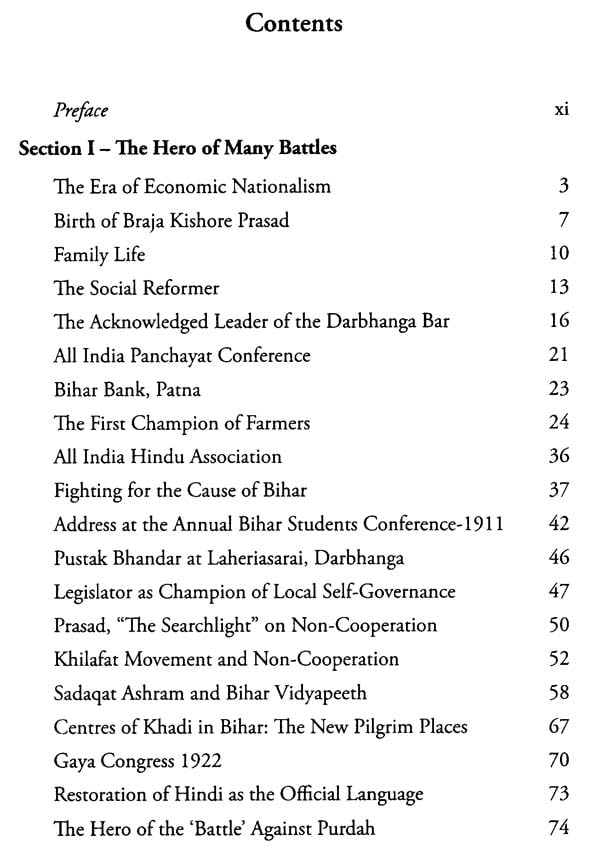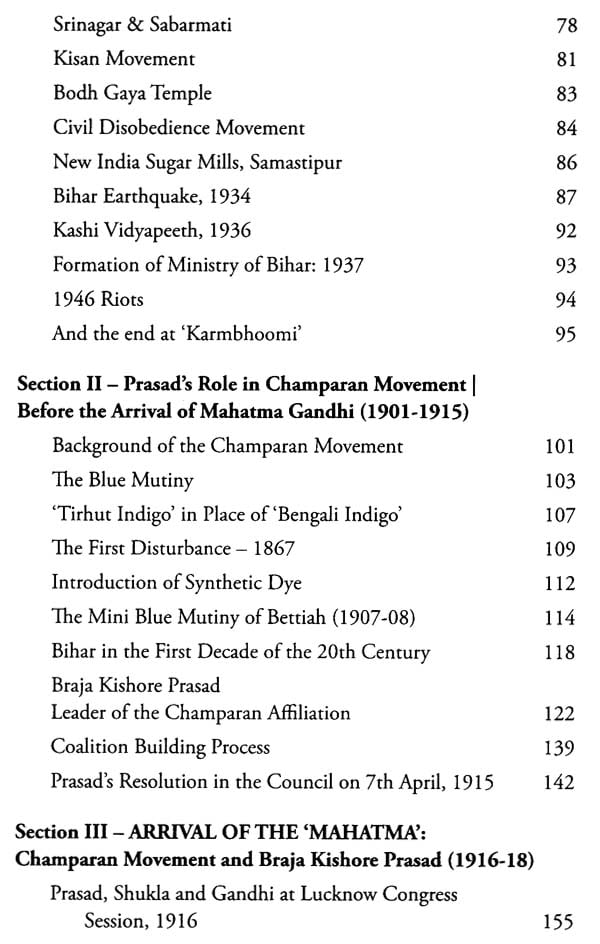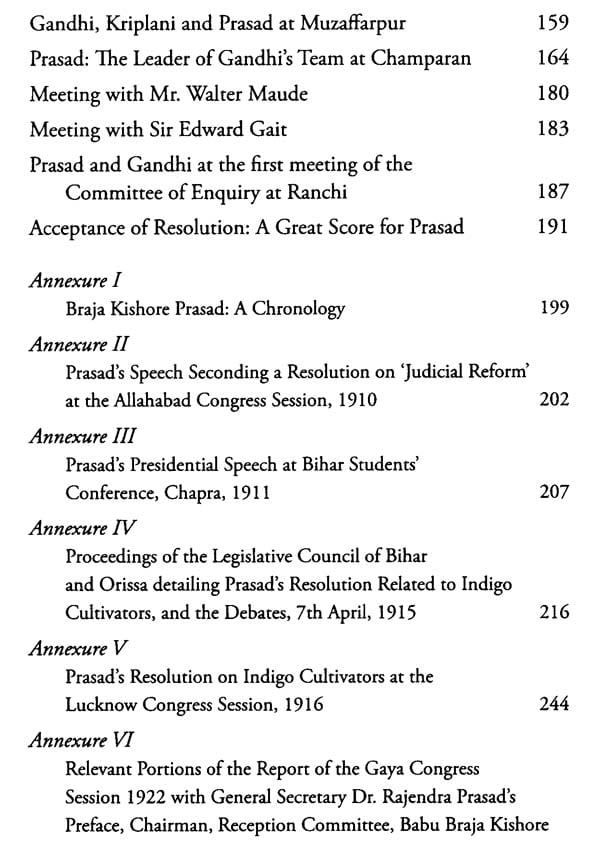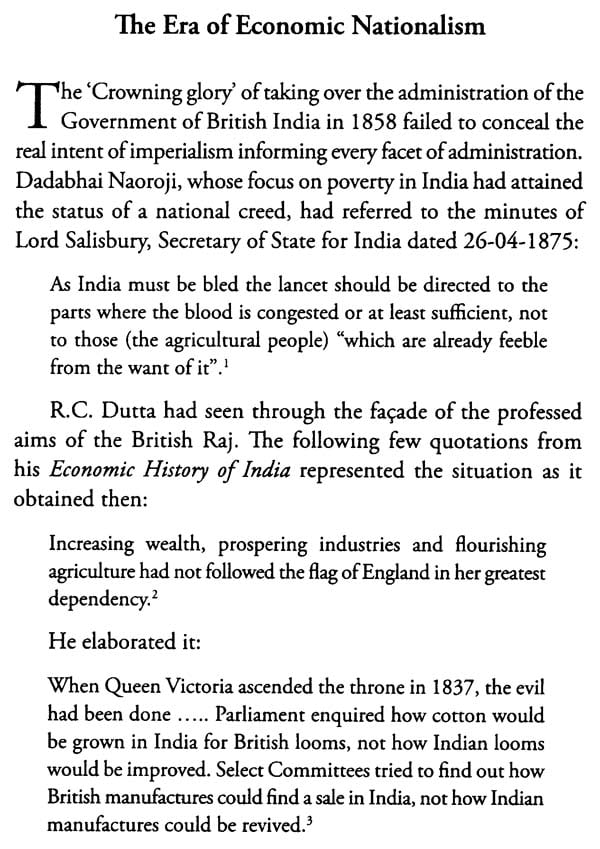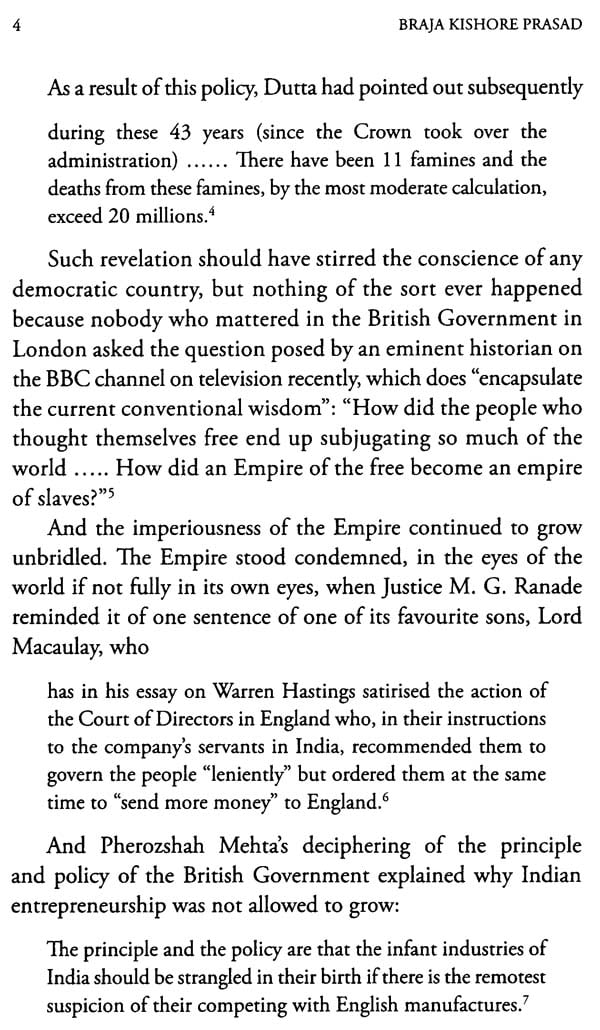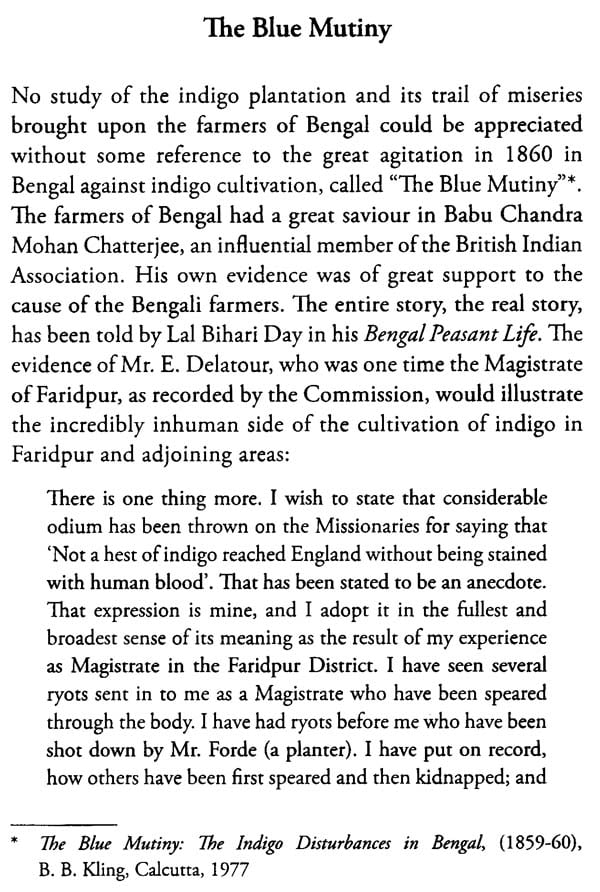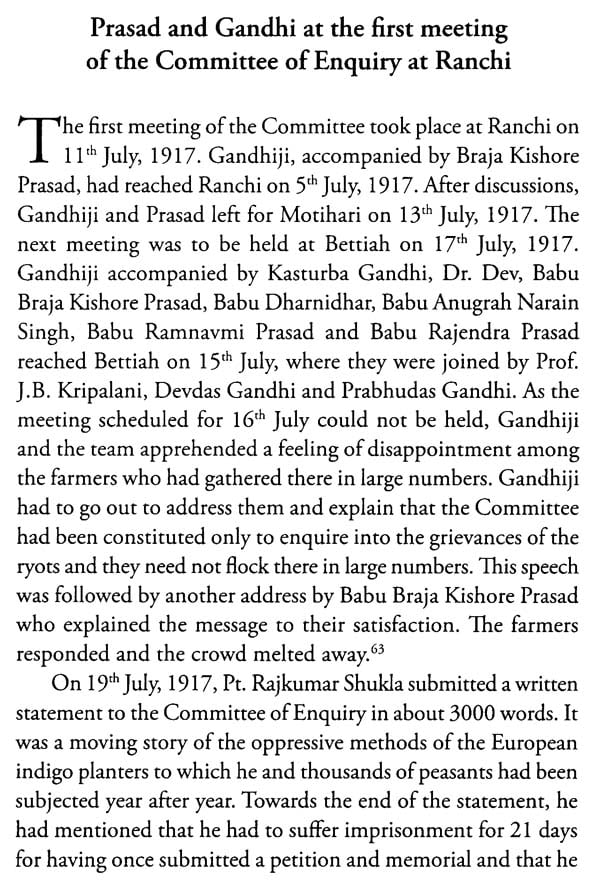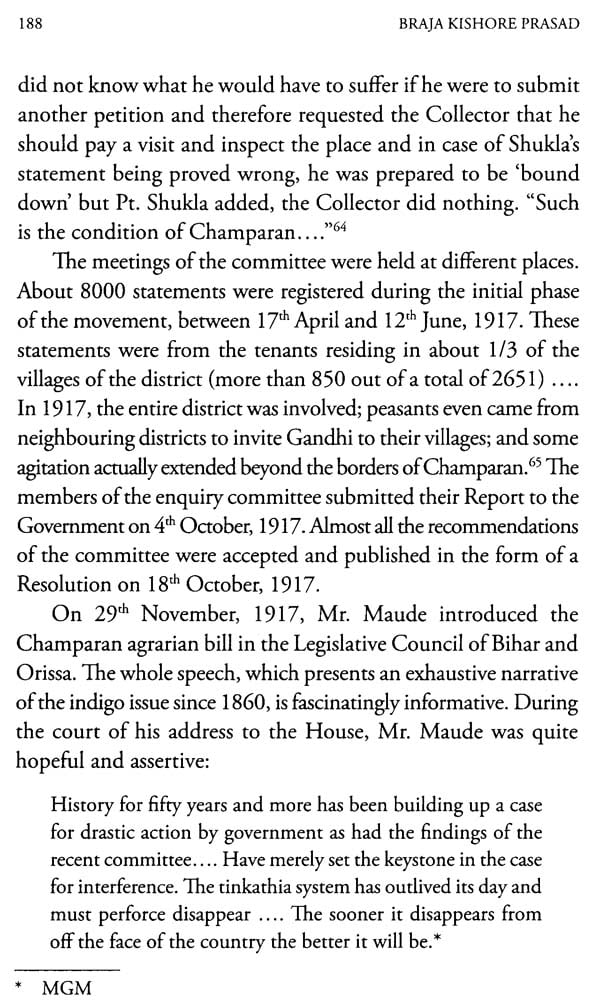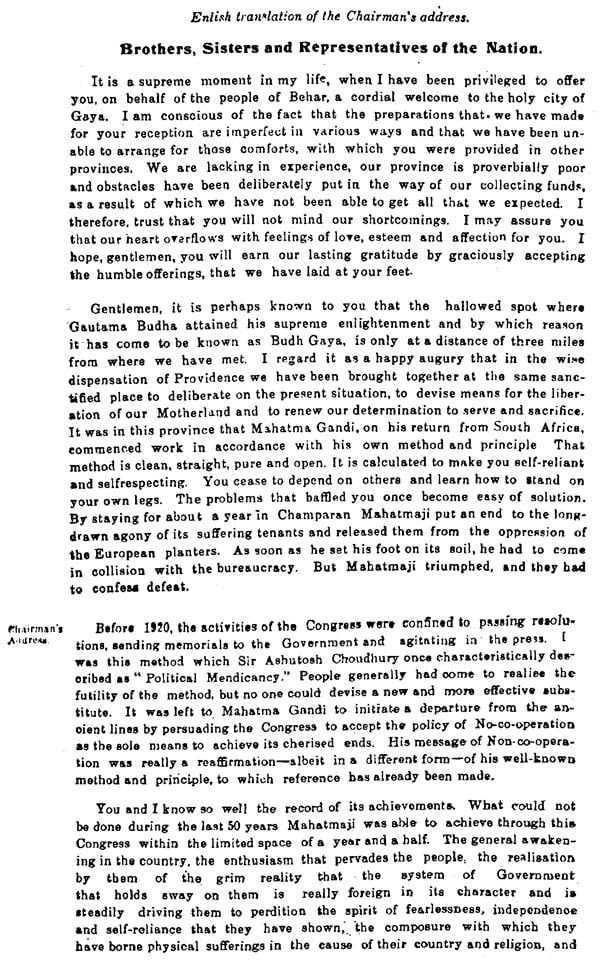
Braja Kishore Prasad - The Hero of Many Battles
Book Specification
| Item Code: | NAU297 |
| Author: | Sachidanand Sinha |
| Publisher: | National Book Trust, India |
| Language: | English |
| Edition: | 2018 |
| ISBN: | 9788123781761 |
| Pages: | 312 |
| Cover: | PAPERBACK |
| Other Details | 8.50 X 5.50 inch |
| Weight | 380 gm |
Book Description
This full length biography of Babu Braja Kishore Prasad (1877-1946), one of the most eminent national movement leaders from Bihar, especially highlights the seminal role played by Prasad in the Champaran Movement even before the coming of Mahatma Gandhi on the scene, and thereafter as the key leader of Gandhi's Champaran team. Prasad's historic Indigo Resolution of 1915 moved by him as a Member of the Legislative Council of Bihar & Orissa precipitated in ways more than one the Champaran Agrarian Act of 1918 that was adopted after Gandhi's Champaran Satyagraha.
The present biography, padded with some valuable historical documents, seeks to introduce to the contemporary generation of readers and researchers alike to the various legal-social-political battles that Prasad waged including the seminal role played by him in the `Bihar Movement', which carved out a separate Bihar from the erstwhile Bengal in 1912.
Especially commissioned on the occasion of the Centenary Year (2017) celebrations of the Champaran Movement, the book is likely to be an eye-opener for the present generation, which, perhaps, at best, knows Prasad as the father of Prabhavati Devi and father-in - law of the prominent Socialist and Sarvodava leader, Jayaprakash Narayan.
Sachidanand Sinha (b. 1938), an MA (English) from Bihar University, Muzaffarpur, and a Master in Public Administration from Harvard University, Massachusetts, USA, is an independent researcher, who has worked on the life and times of the almost forgotten national movement leaders from Bihar like Mahesh Naravan (1858-1907) and Babu Braja Kishore Prasad. A distinguished poet in Hindi, with much acclaimed poetry collections,.-tathwan Din and Dasam Rasa (both published by Radhakrishna Prakashan, New Delhi) and a member of the Indian Administrative Service (Bihar: 1963), he retired as the Finance Secretary, Government of Bihar. Before joining the Civil Services, he was a Lecturer in English at C.M. College, Darbhanga. His ongoing projects include In Conversation with Fellow Civil Servants, and How the Trees of Life Fruited in the Forbidden Land - an account of the success of the plantation of coconut palms in non-traditional area like Koshi Dix ision started in 1980 by the author as Chairman, Koshi Command Area, Saharsa, Bihar.
The fruits of my nearly a decade of engagement with the life and persona of Babu Braja Kishore Prasad are now in the hands of the reader. It was sometime in 2008-09 that the idea of bringing before the contemporary generation the rather forgotten role and contribution of some of the makers of modern Bihar, and by implication of modern India, got hold of me, and with the passage of time the idea started taking a concrete form.
The first opportunity of systematically exploring the personality of Braja Kishore Prasad (1877-1946) in the present-day context appeared before me in the form of an invitation to present a longish paper on him at a National Seminar held at India International Centre, New Delhi in 2012 organised by Rajendra Bhawan Trust, New Delhi.
The occasion was the commemoration of the 125th Birth Anniversary of Dr. Rajendra Prasad (1884-1963), surely one of the tallest figures of the national movement belonging to Bihar with a pan-India recognition, and the first President of independent India. Thus was born a paper on Babu Braja Kishore Prasad, titled 'The Hero of Many Battles', which forms the first section of this book, though it has undergone some very vital changes from since it was presented as a seminar paper.
The seminar paper proved to be just an important juncture of a long journey that I was destined to embark upon with the life and times of Babu Braja Kishore Prasad. One may say that since his major Karmabhumi was Darbhanga, the place where I was born and brought up and studied till graduation, there must have been some deeper connect for me with the great Prasad.
Actually speaking, it was the seminal role played by Prasad, as a legal luminary, as a legislator, as a nationalist and, above all, as a humanitarian, in addressing the plight of indigo cultivators, much before the arrival of Mahatma Gandhi in Champaran that prodded me to project this hitherto unknown aspect of Prasad before the current generation of readers and researchers alike. Hence, Prasad's engagement with the concerns of indigo cultivators, which formed just a part of the seminar paper as mentioned above, became a full-fledged subject of inquiry for me.
With the passage of time, the centenary year celebrations of the Champaran Satyagraha approached and a major national seminar was organised at the historic Langat Singh College, Muzaffarpur, Bihar, my alma mater, on 9-10 April 2017, to commemorate the first halt of Mahatma Gandhi at the college hundred years ago on his way to Champaran from Patna. At this seminar, I was invited to present a paper, and the crucial aspect of Prasad vis-a-vis his role in the Champaran Movement, became part of the paper that I presented there.
However, the process of editing, writing and re-writing a full fledged book based mainly on these two papers has continued since then, hence a word about the structure of the book may be in order. As stated, Section I provides a general survey of the life and work of Prasad with a brief chapter on his engagement with the cause of indigo. This chapter sort of provides a link to the rather elaborate and analytical treatment of a gamut of issues--historical, social and legal-- pertaining to the plight of indigo cultivators, and the vital role of being a silent anchor played by Prasad.
That is why, we have two separate sections projecting and detailing the work of Prasad in the Champaran Movement. Section II, while tracing out the history of the Movement, highlights Prasad's contribution in preparing the ground, as it were, for the arrival of the Mahatma for the final onslaught, which is detailed in Section III.
The Annexures, which reproduce some very valuable documents pertaining to the resolutions and speeches of Prasad as legislator and political leader, have now become a section in themselves, thereby, adding value to the overall presentation and content of the book.
Here, I would also like to point out that in the contemporary documents, reports, magazines, and later publications, the full name of Prasad has been spelled in various manner. At some places, it has been written as Braja Kishor Prasad or as Braj Kishore Prasad, and sometimes as Brajkishore Prasad, and also as Brij Kishore Prasad. In order to maintain a uniformity, I have used 'Braja Kishore Prasad' as that seems to be more correct way of writing his name.
During the course of last one decade, I have benefitted from interactions with a number of individuals, and support from state and national institutions, archives, libraries, etc. While it may not be possible to acknowledge one and all, I will surely like to put on record my deep appreciation for the support received, among others, from the Bihar State Archives, Patna; Sinha Library, Patna; Babu Braja Kishore Smarak Pratishthan, Patna; National Archives of India, New Delhi; Nehru Memorial Museum & Library, New Delhi; The Digital Repository of Gokhale Institute of Politics and Economics (www.dspace.gipe.ac.in).
**Contents and Sample Pages**
